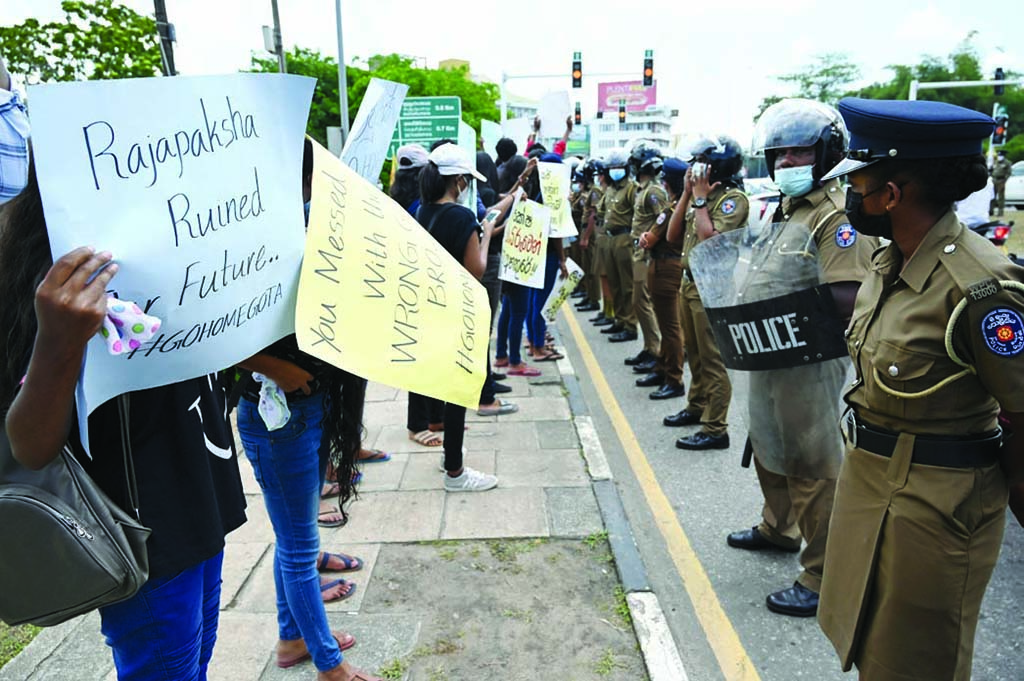Colombo: Sri Lanka's beleaguered president has appointed an expert panel to organise a debt restructure to claw the country out of a crippling economic crisis that has sparked huge protests demanding his resignation. Scarce supplies of food and fuel, along with record inflation and regular blackouts, have inflicted widespread misery in the country's most painful downturn since independence from Britain in 1948.
Rating agencies have warned of a potential default on Sri Lanka's $51 billion foreign debt, and authorities have been unable to raise more commercial loans because of credit downgrades. President Gotabaya Rajapaksa's office said late Wednesday that the three-member advisory panel had been tasked with guiding Sri Lanka through a "sustainable and inclusive recovery".
His government is preparing for bailout negotiations with the International Monetary Fund, and finance ministry officials told AFP the trio will prepare a programme for sovereign bond holders and other creditors to take a haircut. "What Sri Lanka is keen to do is avoid a hard default," a source from the ministry, who requested anonymity, told AFP. "It will be a negotiated restructuring of the debt with the help of the IMF."
Parliamentary Speaker Mahinda Yapa Abeywardana warned Wednesday that the economic crisis could lead to starvation unless addressed within the week. Meetings with the IMF are set to begin by next week but Finance Minister Basil Rajapaksa-the president's brother-resigned on Sunday night along with nearly the entire cabinet.
The country is still without a replacement, with his successor quitting after just one day in office. Public anger is at fever pitch, with crowds attempting to storm the homes of several government figures and demanding President Rajapaksa's resignation. Security forces have dispersed protests with tear gas, water cannon and rubber bullets, and dozens have been arrested-many saying they were tortured in police custody.
Opposition parties have rejected the president's overture to form a unity administration and joined calls for him to step down. But chief government whip Johnston Fernando reiterated Thursday that Rajapaksa would stay in office to lead the country out of the crisis. The government has lost its majority in parliament but there has so far been no clear signal that opposition legislators will attempt a no-confidence motion to topple the administration. A critical foreign currency shortage has left Sri Lanka struggling to import essential goods, with the pandemic torpedoing vital revenue from tourism and remittances.
Rating agencies have warned of a potential default on Sri Lanka's $51 billion foreign debt, and authorities are unable to raise more commercial loans because of credit downgrades. Economists say the crisis has been exacerbated by government mismanagement, years of accumulated borrowing and ill-advised tax cuts. Meanwhile, a Sri Lankan court on Thursday placed a travel ban on the country's recently resigned central bank chief following allegations he is responsible for the island's crippling economic crisis.
The magistrate in Colombo ordered Ajith Cabraal, who quit on Monday, to appear in court on April 18 to answer a complaint against him. The court asked immigration authorities not to allow him to leave the island after a rights activist filed a petition against him. Cabraal, who was handpicked to lead the bank by President Gotabaya Rajapaksa, was responsible for Sri Lanka's acute foreign exchange shortage and other financial woes, activist Keerthi Tennakoon argued. Tennakoon told the court the former bank chief was also responsible for insider trading when he led the institution between 2006 and 2015. He was appointed to a new term in September last year.
Cabraal quit on Monday a day after the cabinet resigned en masse except Prime Minister Mahinda Rajapaksa, the president's brother. A replacement has yet to be appointed. Senior government figures have accused the banker of misleading President Rajapaksa and preventing Colombo from seeking a bailout from the International Monetary Fund at an earlier date. Last month the government said it will finally go to the IMF for help but talks are yet to begin. Cabraal previously insisted he had a homegrown solution to boost foreign reserves, but the government has now run out of dollars to pay even for essential supplies. The former bank chief was not immediately available for comment on Thursday. - AFP











